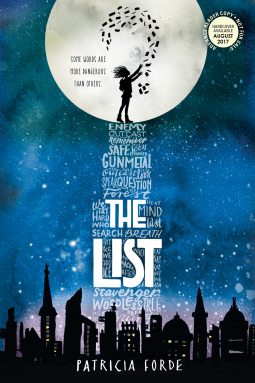THE LIST
by Patricia Forde
Sourcebooks Jabberwocky
Upper Middle Grade/Tween Dystopian
336 pages
ages 10 (12) +
COMING. . .
AUGUST 1, 2017!!!
Fahrenheit 451 meets The Giver for tweens in this gripping story about the power of words and the dangers of censorship.
In the city of Ark, speech is constrained to five hundred sanctioned words. Speak outside the approved lexicon and face banishment. The exceptions are the Wordsmith and his apprentice Letta, the keepers and archivists of all language in their post-apocalyptic, neo-medieval world.
On the death of her master, Letta is suddenly promoted to Wordsmith, charged with collecting and saving words. But when she uncovers a sinister plan to suppress language and rob Ark’s citizens of their power of speech, she realizes that it’s up to her to save not only words, but culture itself.
In the city of Ark, speech is constrained to five hundred sanctioned words. Speak outside the approved lexicon and face banishment. The exceptions are the Wordsmith and his apprentice Letta, the keepers and archivists of all language in their post-apocalyptic, neo-medieval world.
On the death of her master, Letta is suddenly promoted to Wordsmith, charged with collecting and saving words. But when she uncovers a sinister plan to suppress language and rob Ark’s citizens of their power of speech, she realizes that it’s up to her to save not only words, but culture itself.
MY TIDBITS
With a wave of greeting to The Giver, this story tackles the power of language, emotion, imagination and bravery in a controlled world which is trying to strangle all four.
Letta lives on a future Earth, where the big 'melting' has left only a few survivors in a place called the Arc. Here, language is controlled and only 500 words are allowed. Speaking any other word is punished by banishment and certain death. Letta holds a rare and important position; she's the Word Smith's apprentice. Not only does she distribute the allowed list, but categorizes no longer used words and files them away in case they might someday be necessary again. When her master goes missing and a wounded traitor of the Arc shows up at her door, her world is turned upside down.
Language is key in this tale, or rather, the attempt to abolish it. The idea is that language enabled unnecessary/useless thoughts, which hindered people to listen and act accordingly in the past. The result was the Melting and almost extinction of mankind. By limiting language to 500 words, needless things such as emotions and imagination no longer get in the way of practicality. It's an interesting premise, but don't think it through too much because it'll hit logic's Swiss cheese. That, however, isn't necessarily important. The theory behind this thought is interesting and worth a couple tumbles through the head. It definitely gets the intended audience (kids 10 and up) to put on those thinking caps and dig a little deeper.
Letta is easy to sympathize with--an average girl (orphan), who has a good life thanks to her master's important position. She supports the odd language laws in the town, but as a person who knows about all of the wonderful words which really exist, questions things at times. Her beginning stand point, the changes she goes through and her later decisions are all understandable and believable. In other words, she's an easy character to like and cheer for the entire way through.
The world comes to life in all of it's hardships, grime and small town quirks. It's not a happy place, throwing this into a definite darker read. The various characters add a lot of flavor and spice, making the every day life colorful and realistic. The descriptions add just the right amount of explanation without weighing down, so that the plot can roll along.
There are many familiar elements from other dystopian works reflected in the plot, but it still carries enough new aspects to make for an interesting read. The plot holds at a quick pace the entire way through and has multi-layers of secrets and intrigue. There are unexpected twists and turns, especially in the way the characters relate to each other. The tension stays high, but then, Letta is up against some pretty gruesome odds. Luckily, she has a good head on her shoulders and isn't overly emotional, but handles things in a fairly believable way.
Although this book is supposedly intended for a middle grade audience, I'd recommend it more for the tweens (ages twelve and up). Some scenes are fairly graphic on the violence and torture side, and not all kids under twelve are ready to digest this type of material.


2 comments:
Wow, it's hard for me to imagine a life narrowed down to only 500 acceptable words. I'm curious as to whether the author kept her narrative within that range. The whole concept piques my interest. So, yes, I'm going to have to read this book. Thanks for such a good review.
Wouldn't it be interesting to see a book written in that range? (A real feat!) But no, this book doesn't do that but rather has the townspeople's dialogue in that range. Even the MC doesn't keep it since she's a 'word keeper' unless she's directly conversing with townspeople.
Post a Comment